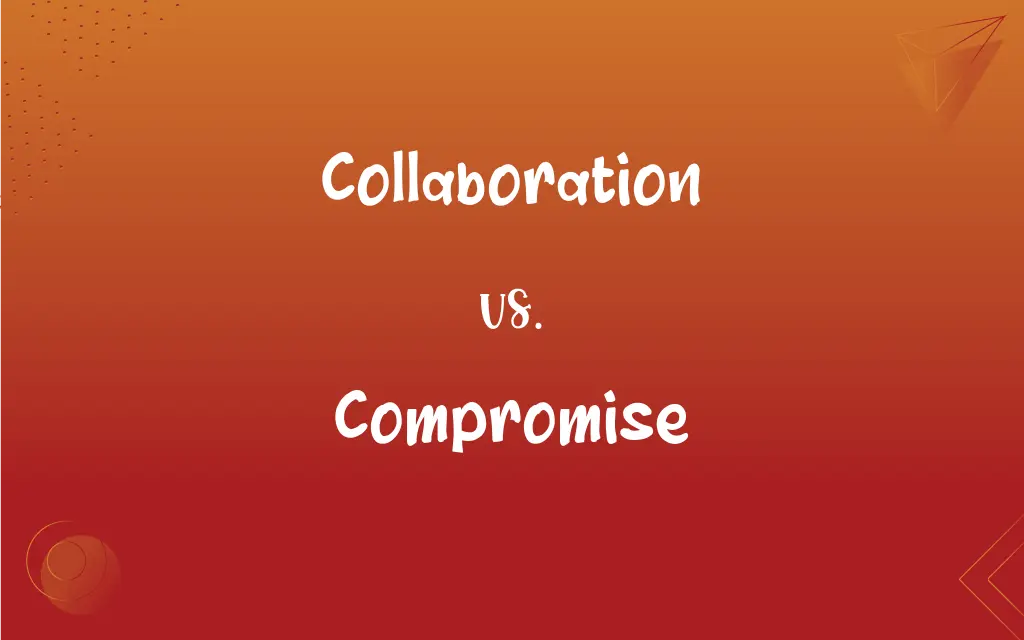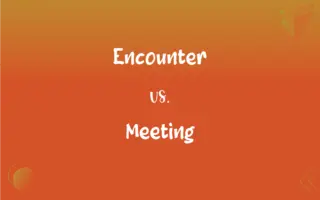Collaboration vs. Compromise: What's the Difference?
Edited by Harlon Moss || By Janet White || Published on December 30, 2023
Collaboration refers to working together towards a common goal. Compromise refers to making concessions by each party to reach an agreement.

Key Differences
Collaboration involves two or more parties working jointly towards a shared objective, emphasizing cooperation and collective effort. Compromise, on the other hand, entails each party making concessions or adjustments to find a mutually acceptable solution.
In collaboration, the focus is on synergy and combining strengths to achieve a common goal, with all parties actively contributing. In compromise, the emphasis is on negotiation, where each party may have to give up something to reach an agreement.
Collaboration is often seen in creative or problem-solving contexts where teamwork and shared ideas lead to innovative solutions. Compromise is more about resolving differences or conflicts, where parties find a middle ground to settle disagreements.
In a collaborative effort, the outcome is usually a product of collective ideas and inputs, reflecting a joint vision. In a compromise, the outcome is a balance of differing views or needs, often requiring some level of sacrifice from each side.
Collaboration can enhance relationships and build stronger teams, as it is based on mutual respect and shared goals. Compromise, while necessary in many situations, may not always leave all parties completely satisfied, as it involves giving up certain aspects or desires.
ADVERTISEMENT
Comparison Chart
Primary Focus
Working jointly towards a common goal
Reaching an agreement by making concessions
Context
Teamwork, innovation, and joint effort
Negotiation and resolution of differences
Outcome
Collective ideas and shared vision
Balance of differing views, with some level of sacrifice
Nature
Synergistic and cooperative
Negotiated and often involves trade-offs
Impact on Relationships
Builds stronger teams and partnerships
May not fully satisfy all parties but resolves conflicts
ADVERTISEMENT
Collaboration and Compromise Definitions
Collaboration
Cooperative interaction among groups to work on a shared objective.
Their collaboration on environmental issues brought effective change.
Compromise
Settling a dispute by mutual concession.
The two parties reached a compromise after lengthy negotiations.
Collaboration
A partnership where parties contribute equally to a project.
The collaboration between the community and the local government improved the neighborhood.
Compromise
A middle-ground solution in a conflict where all sides make concessions.
Finding a compromise, they alternated leadership roles in the project.
Collaboration
A joint effort of multiple entities combining their expertise.
Their collaboration in research resulted in significant scientific breakthroughs.
Compromise
A negotiated agreement where conflicting parties agree to give up something.
To resolve their differences, they made a compromise on the deadline.
Collaboration
Working together with others to achieve a common goal.
The collaboration between the two companies led to a groundbreaking product.
Compromise
Adjusting one's demands or position to reach a mutual agreement.
The compromise involved adjusting their schedules to meet the project timeline.
Collaboration
To work together, especially in a joint intellectual effort.
Compromise
An agreement where each party gives up something to reach a solution.
In a compromise, they agreed to split the costs equally.
Collaboration
To cooperate treasonably, as with an enemy occupation force in one's country.
Compromise
A settlement of differences in which each side makes concessions.
Collaboration
(uncountable) The act of collaborating.
Collaboration can be a useful part of the creative process.
Compromise
The result of such a settlement.
Collaboration
(countable) A production or creation made by collaborating.
The husband-and-wife artists will release their new collaboration in June this year.
Compromise
Something that combines qualities or elements of different things
The incongruous design is a compromise between high tech and early American.
Collaboration
(uncountable) Treasonous cooperation.
He has been charged with collaboration.
Collaboration
The act of working together; united labor.
Collaboration
The act of willingly cooperating with an enemy, especially an enemy nation occupying one's own country.
Collaboration
Act of working jointly;
They worked either in collaboration or independently
Collaboration
Act of cooperating traitorously with an enemy that is occupying your country
Collaboration
The act of cooperating as a team to create or achieve something.
Artists from different genres went into collaboration for the music festival.
FAQs
Is compromise always necessary in disagreements?
Often, but not always; sometimes other conflict resolution methods are used.
Can collaboration occur in competitive environments?
Yes, even competitors can collaborate for mutual benefits.
What does compromise mean?
Making concessions by each party to reach an agreement.
How does collaboration benefit a team?
It brings diverse skills together, fostering innovation and efficiency.
What is collaboration?
Jointly working with others towards a common objective.
What makes a collaboration successful?
Clear communication, mutual respect, and shared goals.
Is compromise a sign of good leadership?
It can be, indicating flexibility and the ability to find balanced solutions.
Are compromises always fair?
Ideally, but sometimes compromises can favor one side more.
What skills are essential for effective collaboration?
Communication, teamwork, empathy, and adaptability.
Can collaboration lead to better solutions than working alone?
Often, as it combines diverse perspectives and skills.
Does compromise resolve all conflicts?
Not always, but it's a common method for finding mutually acceptable solutions.
What challenges can arise in collaboration?
Differences in opinion, communication barriers, and unequal participation.
What's the role of trust in collaboration?
Trust is crucial for open communication and effective teamwork.
Does compromise mean losing something?
It involves giving up some aspects to reach a mutually acceptable solution.
Can compromise be seen as a weakness?
Not necessarily; it's often a pragmatic way to resolve differences.
Is collaboration possible without agreement on all aspects?
Yes, collaboration can thrive despite differences, focusing on common goals.
How does technology affect collaboration?
It enables easier and more efficient collaboration, especially remotely.
How does compromise affect relationships?
It can strengthen them by showing flexibility and respect for others' views.
Can a compromise be renegotiated?
Yes, if circumstances change or if the initial agreement is not working.
How do you ensure a fair compromise?
Through open dialogue, understanding each party's needs, and seeking a balanced solution.
About Author
Written by
Janet WhiteJanet White has been an esteemed writer and blogger for Difference Wiki. Holding a Master's degree in Science and Medical Journalism from the prestigious Boston University, she has consistently demonstrated her expertise and passion for her field. When she's not immersed in her work, Janet relishes her time exercising, delving into a good book, and cherishing moments with friends and family.
Edited by
Harlon MossHarlon is a seasoned quality moderator and accomplished content writer for Difference Wiki. An alumnus of the prestigious University of California, he earned his degree in Computer Science. Leveraging his academic background, Harlon brings a meticulous and informed perspective to his work, ensuring content accuracy and excellence.






































































